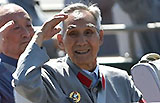Solar-powered plane breaks solo flight record across Pacific to Hawaii
(Agencies) Updated: 2015-07-03 10:25
HONOLULU - A Swiss man attempting to circumnavigate the globe with an aircraft powered only by the sun's energy has broken a world record for the longest non-stop solo flight, the project team said on Thursday.
The Solar Impulse, which took off from Japan on Monday on the seventh leg of its journey and is expected to land in Hawaii by the weekend, shattered the solo-flight record threshold of 76 hours while crossing the Pacific.
The aircraft, piloted alternatively by Swiss explorers Andre Borschberg and Bertrand Piccard, set off on its 22,000-mile (35,000-km) journey around the world from Abu Dhabi on March 9.
"Can you imagine that a solar powered airplane without fuel can now fly longer than a jet plane!" said Piccard in a statement. "This is a clear message that clean technologies can achieve impossible goals."
The plane, which was piloted by Borschberg when it broke the record, weighs about as much as a family sedan and has 17,000 solar cells across its wingspan.
Overall, its trip around the globe was expected to take some 25 flight days, broken up into 12 legs at speeds between 30 to 60 miles per hour (50 and 100 kph).
The Solar Impulse 2 initially left Nanjing, China, on May 31 for Hawaii, but was forced to cut short its bid a day later due to what Borschberg termed "a wall of clouds" over the Pacific. It landed in the central Japanese city of Nagoya.







